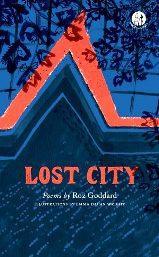Poetry review – LOST CITY: Charlie Hill finds there are consolations among the bleak settings for Roz Goddard’s poems
 Lost City
Roz Goddard
The Emma Press, 2020
ISBN 978-1-912915-46-0
26 pp € 5.00
Lost City
Roz Goddard
The Emma Press, 2020
ISBN 978-1-912915-46-0
26 pp € 5.00
It’s difficult to resist the bleak just now. This book ‘examines the impact of post-industrialisation and the effect of toxic political leadership on the collapse of cities and communities’ and hence you might expect the ‘loss’ in the title to signify total loss. After all, it’s not only material indications of civilisation that are struggling to survive, but our capacity to comprehend. In ‘The Tour Guide as Bird Watcher’, a bird ‘Scratches out lines in soil we try to know,/meaning: grace in rain, meaning: element,/meaning: home.’
In spite of all this, however, the book is surprisingly full of comforts. This is from “The Photographer”:
Tired of the abandoned and broken, wanting
to dodge the sun, I took to walking early, looking
for sudden things: a scarf tied to a post, pale birds
I didn’t recognise, quaffed, bellies to the ground,
rising, wingbeats all grace and white.
These ‘sudden things’ and the possibility of finding solace in the everyday recur, frequently illustrated by the encroachment of the natural world upon the one that humans have given over to decay. In “The Tour Guide Leads A Group Through The Museum of Blue Delicacy”, where
Locked-in air,
moondrop chandeliers,
organs choked in basement silos, nettles –
lemon-scented – wound on banister rails
the desolation is explicitly ameliorated:
…Let us be foxes treading lightly,
noses to the drama of a shining night,
holding stars in the emptiness.
It’s not just consolation that’s hinted at here. That exhortation to hold stars in the emptiness, despite it all, is also a point of resistance. This defiance is also conveyed in Goddard’s attitude to near-contemporary politics, which is run through with an eviscerating wit:
The President comes to the lost city
and is greeted by a flock of pheasants.
Though he cannot read he carries
the world’s greatest text on love.
He’s here to witness the stillness of wolves;
merchants selling milk from the backs of mules.
He thinks we’re like him. We’re not.
Dentists were the first to leave and now
our teeth are beyond saving.
It’s hard for me to read Lost City without bringing to mind Helen Ivory’s conceptually similar chapbook Maps of the Abandoned City (reviewed here) in which she ‘imagines a place deserted by its makers.’ But if the best of Ivory’s work is elusive, surreal, then Lost City – although no less rich – might be best defined by its intent and the readiness with which it can be grasped. As an example of what I mean by this, here is “Citizen”, one of many excellent poems in this excellent sequence, quoted in its entirety:
For those of us remaining everything is ours.
Windows blown to standing snow, shelves
of books rimed with dust, tower blocks
we could forklift to other cities to begin again.
Closed-off gas in airy rooms, dentist chairs,
careful notes on how to treat the petrified.
All manner of ceramics, cloth, baroque lamps
too heavy to move, spilled mugshots of the lost.
A fancy car is sand-blown on the street;
places of worship are harbourless ships
sprouting green. Parsley kisses you from
its empty stem – push a sanctuary door
to a clock ticking once a century.
Take all the silence you can carry.
Dec 1 2020
London Grip Poetry Review – Roz Goddard
Poetry review – LOST CITY: Charlie Hill finds there are consolations among the bleak settings for Roz Goddard’s poems
It’s difficult to resist the bleak just now. This book ‘examines the impact of post-industrialisation and the effect of toxic political leadership on the collapse of cities and communities’ and hence you might expect the ‘loss’ in the title to signify total loss. After all, it’s not only material indications of civilisation that are struggling to survive, but our capacity to comprehend. In ‘The Tour Guide as Bird Watcher’, a bird ‘Scratches out lines in soil we try to know,/meaning: grace in rain, meaning: element,/meaning: home.’
In spite of all this, however, the book is surprisingly full of comforts. This is from “The Photographer”:
These ‘sudden things’ and the possibility of finding solace in the everyday recur, frequently illustrated by the encroachment of the natural world upon the one that humans have given over to decay. In “The Tour Guide Leads A Group Through The Museum of Blue Delicacy”, where
the desolation is explicitly ameliorated:
It’s not just consolation that’s hinted at here. That exhortation to hold stars in the emptiness, despite it all, is also a point of resistance. This defiance is also conveyed in Goddard’s attitude to near-contemporary politics, which is run through with an eviscerating wit:
It’s hard for me to read Lost City without bringing to mind Helen Ivory’s conceptually similar chapbook Maps of the Abandoned City (reviewed here) in which she ‘imagines a place deserted by its makers.’ But if the best of Ivory’s work is elusive, surreal, then Lost City – although no less rich – might be best defined by its intent and the readiness with which it can be grasped. As an example of what I mean by this, here is “Citizen”, one of many excellent poems in this excellent sequence, quoted in its entirety: